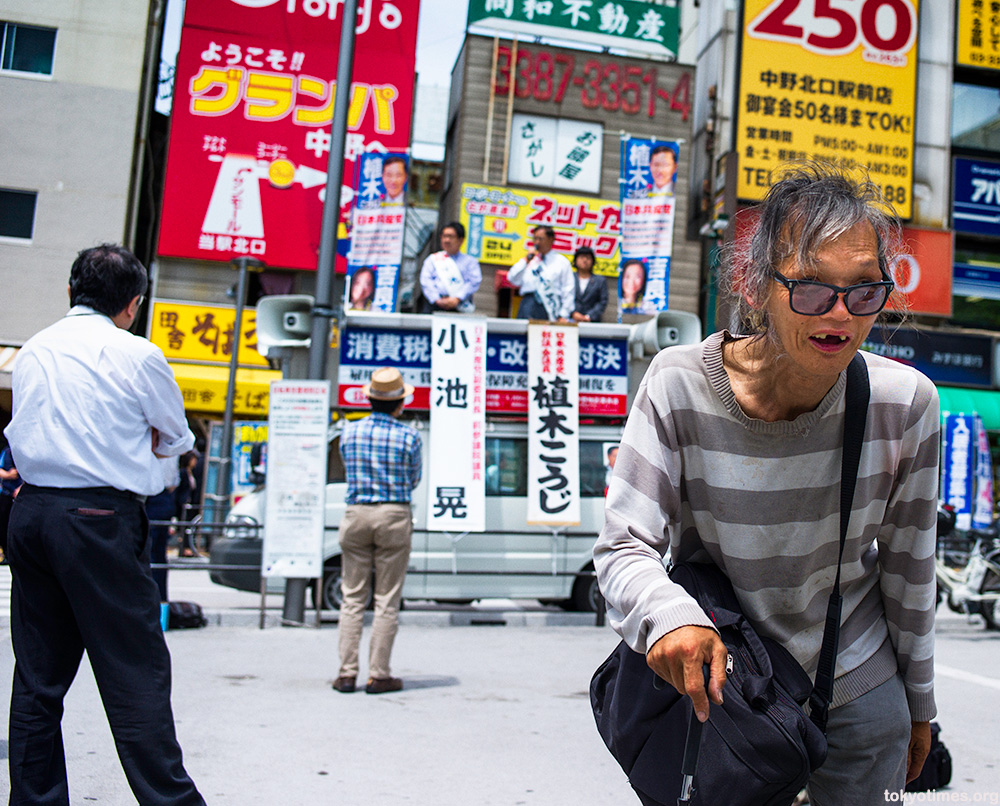Just like Japan’s other attempts at democracy, last weekend’s Tokyo assembly election saw the capital hit by the usual campaign tactics; namely, the familiar sound of vested interests echoing round train stations and local neighbourhoods, as prospective candidates repeatedly bellow their names and not much else through ear-splitting sound systems.
However, with a voter turnout of only 43.5% — 11% down from 2009 and the second lowest figure on record — there’s a suggestion that after years of economic stagnation, bureaucratic waste and the ongoing problems of Fukushima, some people are finally turning their backs on politicians who did the same to the electorate a long time ago.

Jeffrey says
As long as I’ve been cognizant of Japan (going back to the late 1970s), I can’t recall a period when the Japanese were anything but the most indifferent participants in their governance. The Enlightenment made brief appearance in Japan in the 1920s, something of a tag along following the importation of everything Western during the Meiji period, but it got stomped into the ground in the 1930s. The post-war Peace Constitution never did anything to make Japan a more politically active place than it ever had been. The brief period of student unrest in the early 1970s notwithstanding, for the Japanese culture (and business) trumps ideology.
David says
Seriously? I live with the in-laws here in Tokyo and the political discussions have been going on for years. In the last 2-3 though they have given up on the politicians as corrupt to the core. If they didn’t have an ideology they wouldn’t be so upset about the political system being so messed up.
Lee says
Personally I’ve found a huge amount of indifference, but at the same time a good deal of interest. Interest that has, however, wained over the last few years. Or perhaps more accurately turned to anger and frustration.
The huge anti-nuclear marches and protests — many of which were scandalously ignored by the mainstream (free?) press — seemed liked a tipping point, but while still active as a movement, it sadly doesn’t seem to have had any impact. But at the same time, the massive number of people involved does suggest there are a lot of passionate but deeply dissatisfied voters out there.
Hans ter Horst says
Since Fukushima, Japan dropped 31 places on the international freedom of press list from reporters without borders, it is now at number 53, the press is very much leaned upon or in colusion with the politicans to avoid abolishing nuclear power. They really need a newspaper like the Guardian in the UK. http://en.rsf.org/press-freedom-index-2013,1054.html
Lee says
Thanks for the link. Very interesting and confirms my suspicions. The coverage, or more accurately the lack of it, really has been a dig race. And agreed, a Guardian equivalent is very much needed…
Jeffrey says
Hans,
It’s always been this way in one degree or another. They existence of the kisha assure that rarely does anyone report something dramatically different than anyone else.
Hans ter Horst says
My wife is Japanese and tells me the same thing, still I like to dream of a Japan where people aren’t just accepting to be picked clean by crooks in bad suits 🙂
Jeffrey says
Your in-laws are, were very much in the minority. If not, then the last 30 years or so of Japanese politics would have been different, no?
Of the two post-WWII “democracies,” only Italy had, until recently, changed “leadership” more frequently. Going back to Nakasone in 1982, Japan has now had 14 PM/governments in the last 31 years. That’s an average of completely reshuffling your government every 2.2 years.
Hans ter Horst says
Politics and democracy in Japan always reminds me of that quote from So Long, and Thanks for All the Fish (Hitchhiker’s Guide to the Galaxy) when an alien arrives and demands to be brought to the Lizard:
“On its world, the people are people. The leaders are lizards. The people hate the lizards and the lizards rule the people.”
“Odd,” said Arthur, “I thought you said it was a democracy.”
“I did,” said Ford. “It is.”
“So,” said Arthur, hoping he wasn’t sounding ridiculously obtuse, “why don’t people get rid of the lizards?”
“It honestly doesn’t occur to them,” said Ford. “They’ve all got the vote, so they all pretty much assume that the government they’ve voted in more or less approximates to the government they want.”
“You mean they actually vote for the lizards?””
But now the people are not voting for the lizards any more and the lizards are just running wild with their stupid little agenda 🙁
Lee says
Ah, Douglas Adams hitting the nail on the head once again. Such a tragedy that he died so young…
Such a tragedy that it’s so accurate in regards Japan too. Politics here really is the ultimate old boys club…